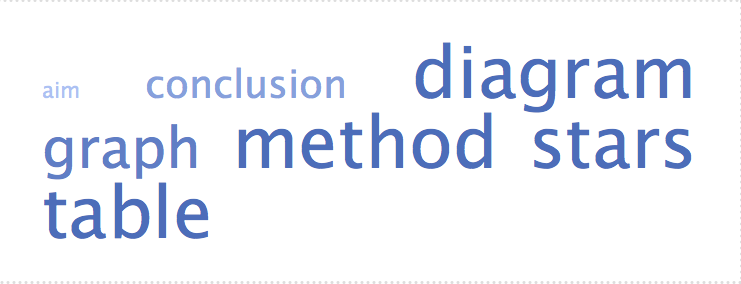I thought I'd have a go at combining some written work with a bit of peer assessment with my two S2 classes, and rather than just doing it to them, tell them the whys and wherefores of what we were doing.
Having given them the task of writing up a piece of practical work, with several specific success criteria to be met, I then got them to look over each others' work, and we went through assessing it.
The pupils came up with examples of what would be necessary to meet the success criteria, and we came up with a 'marking scheme' that ended up (more by happenstance than design) to be out of ten.
Once we'd gone over a few quibbles and ironed out a few misunderstandings, I asked them to have a go at commenting their class mates work - in a 'two stars and a wish' format.
After this, we went round the room looking at what people had written for 'stars' and wishes', and used the responses to build up a visualised collection of each using tagcrowd.com (I'd have preferred to try wordle.net , but it still doesn't work with our firewall).
The images below show these collected responses.
 Having produced these visualisations, the pupils were quick to realise what they represented, and also what they could see from comparing them -
Having produced these visualisations, the pupils were quick to realise what they represented, and also what they could see from comparing them -
- how many more stars there were than wishes
- how straightforward it would be to achieve the wishes when we next do something like this
And, for me, the clincher -
- how little they got from just marking things out of ten
The pupils had been, on the whole, very fair in their assessments of their classmates work, very positive in their praise of those parts worthy of 'stars' and encouraging in the comments used for 'wishes'. Most agreed that this way of doing things was more useful than just looking at their mark out of ten, though a few maintained that they wanted to know who they'd done better than.
This type of comment started a discussion about 'being better', where one pupil pointed out that they should all be trying to be better than themselves, not competing with each other. There wasn't a great deal more to say after that.
Pleased with the outcome of these endeavours, I'm going to try the same type of thing with my S6 AH Physics pupils as they write up an experiment we did last week for their LO3. This time the criteria will not be agreed by the pupils, rather dictated by the SQA, but I'm hoping some quality feedback on their work from their peers will lead to fewer draft/re-draft iterations before their work meets the required standard.
Wonder if they'll be as positive about the process as my S2 pupils were....
